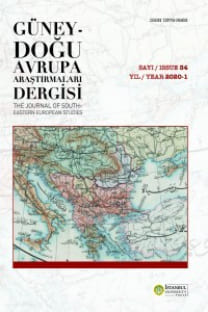ANKHİALOS SAVAŞl'NIN SONUNA KADAR BİZANS-BULGAR İLİŞKİLERİ
Biza11s lmparator/11g11 '111111 B11/garlarla ili~kisi V. yiizyi/111 iki11ci yartsmda ba~ladt . Bu/gar ismi11i11 ortaya 91k1~·1 ve Bizans kay11aklar111da yer af111as1 do bu doneme rastlamaktad1r. Bufgarlar Kubrat lider/igi11de 635 yt!mda ilk de1l/et/eri11i tesis elliler. K11brat '111 o/iimii11de11 sonra be~ og/1111dan biri 0/011 Asparuli, Tuna Neliri civar111a geldi ve Biza11s i111parator/11g11 ile miicadeleye ba~lad1. /mparator IV. Ko11sta11ti11os 'u mag/up eden Asparu/i, 681 yi/111da Tuna '11111 gii11eyi11de Tuna Bu/gar Devleti '11i kurdu. IV. Ko11sta11ti11os bu dev/eti tamyarak Bu/gar/aria ban~· yap11. Asparuli 'wt yerine ge9e11 Tervel, II. J11sti11ia1111s 'un 705 yi/111da ikinci kez tahta 91k111as111a yard1111c1 oldu. //. Justi11ia1111s ona pek 9ok hediye ile bir/ikte "Caesar" 1111110111 verdi. V. Ko11sta11ti11os doneminde Bufgarlarla miicadele devam elli ve imparalor 011/ara kar~t dokuz sefer yaptt. 763 yilmdaki A11khialos Sava~t Biza11s '111 kesin zaferiyle son119/a11d1. Ancak Biza11s-B11/gar miicadelesi b1111da11 sonra do devam etti.
Anahtar Kelimeler:
Bulgarlar, İmparator IV. Konstantinos, Kubrat, İmparator Justinianos, Tervel
THE BYZANTINE-BULGARIA RELATIONS UNTIL THE BATTLE OF ANKHIALOS
The Byzantine-Bulgaria relations started in the second half of the 5th cent111y. The name "Bu/gar" occurs in Byzantine sources at the same period as well. The first Bulgarian state was founded by Kubrat in 635. After Kubrat 's death Asparuch, one of his five sons, came to River Danube and started to struggle with Byzantine Empire. Defeating the Emperor Constantine IV, Aspa111ch founded the Bulgarian State of Danube in 681. The Emperor acknowledged this state and made peace with Bulgarians. After death of Aspal'Uch his successor Tervel provided Justinia1111s fl to regain his throne in 705. Justinia1111s JI rewarded Tervel with lavish gifts and the rank of "Caesar". Constantine V continued to struggle with Bulgarians and made nine expeditions against them. Finally the Emperor fought a bloody battle with Bulgarians at Ankhialos in 763 and defeated them. However, The Byzantine-Bulgarian stl'Uggle has continued during later cell/uries.
Keywords:
Bu/gars, Emperor JV. Konstantinos, Kubrat, Emperor fl. Justinianos, Tervel,
___
- -
- ISSN: 0378-3863
- Başlangıç: 1974
- Yayıncı: İstanbul Üniversitesi
Sayıdaki Diğer Makaleler
ABD'NiN BULGARiSTAN'IN KURTULUŞU KONULU MEMORANDUMU (20 ARALIK 1918)
XV. VE XVI. YÜZYILLARDA YANBOLU ŞEHRİ
TATAR ALİM KURBANALİ HACI HALİDOĞLU'NUN ORTA VE GUNEYDOĞU AVRUPA SEYAHATI
ABD'NİN KIBRIS POLİTİKASI VE TÜRK KAMUOYU (1950-1964) (Johnson Mektubu'na Kadar)
ANKHİALOS SAVAŞl'NIN SONUNA KADAR BİZANS-BULGAR İLİŞKİLERİ
GÜNEY DOĞU AVRUPA ARAŞTIRMALARI ENSTİTÜSÜ/MERKEZİ'NİN KURULUŞU VE FAALİYETLERİ (Kuruluş 1969)
TÜRKİYE'DE TARIMSAL YAPIDAKİ DEĞİŞİM SÜRECİNDE BAZI ÖNGÖRÜLER VE AVRUPA BİRLİĞİNE İHRACAT İMKANLARI
TANZİMAT DÖNEMİ TAŞRA YÖNETİMİNDE SELANİK ÖRNEĞİ
KONSTANTiNOPOLiS KiLiSESi'NiN KURULU$U: MiTOLOJi VE TARiH
